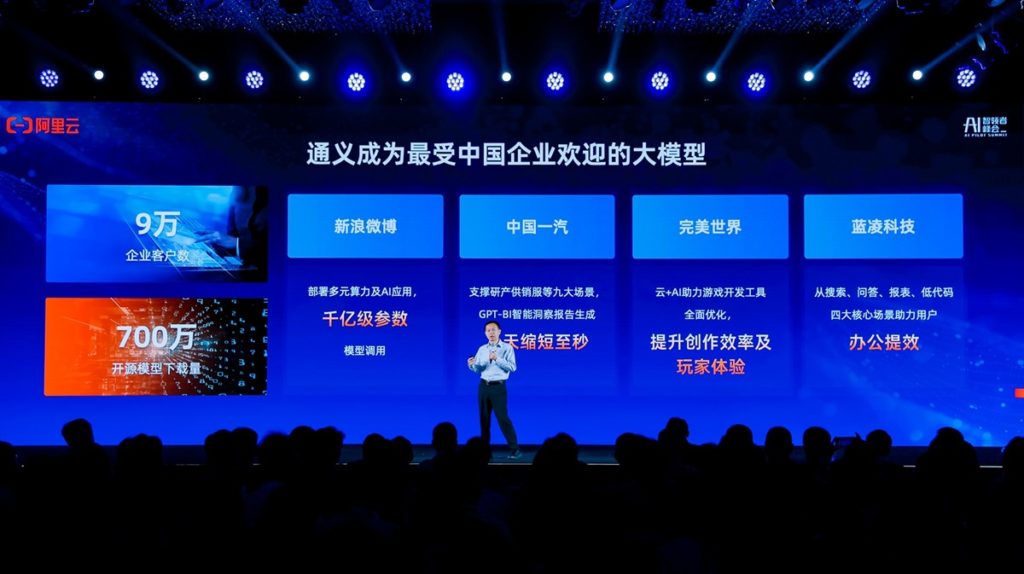The MaaS Pioneer Upgrades its AI Development Platform, Unveils Enhanced Propriety LLM Model, and Expands Open-source Offerings to Cater for Soaring Generative AI Demand
Alibaba Cloud, the digital technology and intelligence backbone of Alibaba Group, today announced a major milestone for Qwen (also known as “Tongyi Qianwen”), its family of proprietary large language models (LLMs). Since June last year, the Qwen family has attracted over 90,000 enterprise deployments through Alibaba Cloud’s generative AI platform, Model Studio, further demonstrating its leadership position backed by robust adoption across industries from consumer electronics, automobiles to gaming, making Qwen one of the most sought-after LLMs in China.
In response to the increasing demand for AI solutions, Alibaba Cloud also introduced the latest addition to its Qwen model family, Qwen2.5. Additionally, the company has continued its commitment to the open-source community by releasing a series of new Qwen models, and upgraded its Model Studio with new AI development resources to fulfil the soaring AI demands from its enterprise users.
“It’s been an exciting journey so far to witness the robust and growing momentum of our family of large language models Qwen, which is truly embraced by our enterprise customers and we have seen so many creative applications of the models from across the industries,” said Jingren Zhou, CTO of Alibaba Cloud. “In the meantime, we have dedicated relentless efforts towards enhancing the capabilities of our models and enriching our suite of AI development services to enable even more innovative applications for our customers.”
“We will also continue to contribute a diverse array of AI models to the open-source communities, and we look forward to collaborating with our customers and developers in seizing the immense growth opportunities presented by the latest surge in the generative AI development.”
Growing Adoption of Qwen by Enterprise Users Through Model Studio
The Qwen family has been deployed by over 90,000 enterprise users via Model Studio since the AI development platform launched in June last year. Over 2.2 million corporate users also accessed to Qwen-powered AI services from DingTalk, Alibaba’s intelligent collaboration workplace and application development platform.
Meantime, the open-source Qwen series, boasting a range of models from 0.5 billion to 110 billion parameters, saw over 7 million downloads on platforms including Hugging Face and Github.
Moreover, ModelScope, China’s largest AI model community led by Alibaba Cloud, now houses over 4,000 models and has garnered a 5-million-strong developer base actively engaging over the past years.
Integrating Qwen in Consumer Electronics and Gaming Industries
Xiaomi, a leader in consumer electronics and smart manufacturing, has integrated Alibaba Cloud’s models into its AI assistant, Xiao Ai, fueling features such as image generation and comprehension across its latest smartphone range and the smart electric vehicle.
This integration empowers Xiao Ai to generate images on the car infotainment system simply through voice commands, offering passengers an enriched in-vehicle experience with interactive entertainment options.
Xiaomi smartphone users can also explore Alibaba Cloud’s image generation model, Tongyi Wanxiang, and the advanced vision-language model Qwen-VL, for different applications including creating visuals, analyzing photos, and generating recipes from food images, all of which help elevate the overall user experience.
Perfect World Games, a Chinese gaming company, has integrated Alibaba Cloud’s Qwen into game development. The combination of cloud and AI capabilities has produced positive effects in multiple areas of game development, including plot, dialogue, audio and animation generation. Looking ahead, the two will deepen collaborations in game elements such as AI non-player character (NPC), real-time content generation, to jointly explore AI in Gameplay.
Elevating Model Studio for Corporate Clients
As the pioneer of the Model-as-a-Service” (MaaS) concept since 2022, Alibaba Cloud offers a full stack of services for developers to simplify AI model development and enable the creation of AI innovations.
To make model training and inferencing even more cost effective and efficient, Alibaba Cloud is rolling out a comprehensive update to Model Studio, its generative AI model and application development platform, with a broader spectrum of models and a wider range of sophisticated AI tools and services.
Developers can now gain access to an expanding roster of high-caliber third-party models from AI companies such as Baichuan AI. Model Studio’s extensive portfolio already boasts over one hundred models, including varying sizes of Qwen.
The revamped Model Studio encompasses a range of advanced developer tools, incorporating LlamaIndex, an open-source framework that facilitates the enhancement of LLMs for application development such as chatbots and analytical tools.
Additionally, a new feature, Assistant API, is released to simplify the development of sophisticated AI assistants. This feature promotes the seamless integration of Retrieval Augmented Generation (RAG) technology to craft context-aware responses and supports advanced functions like multi-agent coordination and memory management.
Introducing Qwen2.5 and Expanding Open-source LLMs
The newly released Qwen2.5, with remarkable advancements in reasoning, code comprehension, and textual understanding compared to its predecessor Qwen2.0, is now available through Model Studio. According to the large model evaluation system OpenCompass, Qwen2.5 demonstrates competitive results in various categories among SOTA (State-Of-The-Art) LLMs.
As a committed contributor to the open-source community, Alibaba Cloud also makes available various sizes of Qwen models. These include Qwen1.5-110B with a staggering 110 billion parameters, which achieved top performance in the pre-trained model category on the OpenLLM Leaderboard, and CodeQwen1.5-7B, a code-optimized version boasting 7 billion parameters, currently reigning atop the base models in Hugging Face’s Big Code Models Leaderboard. The company also plans to share the 7 billion-parameter and 72 billion-parameter variants of Qwen2.0 in the upcoming months.
